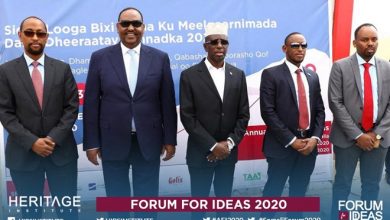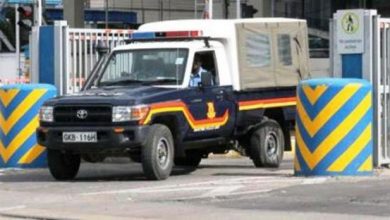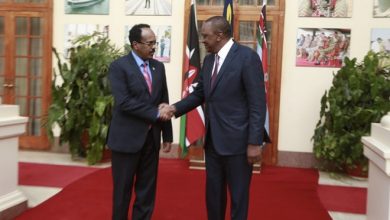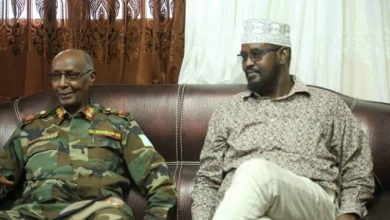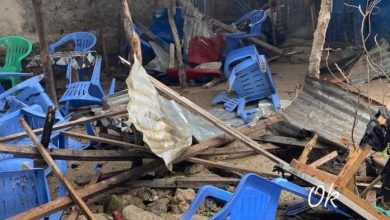Imam Targeted in Minnesota Mosque Bombing Blasts Trump’s Attack on Somalis
Shortly before dawn on Aug. 5, 2017, an explosion tore through Dar Al-Farooq Islamic Center in Bloomington, Minnesota, nearly killing the mosque’s imam, Mohamed Omar. At first, the Trump administration suggested the attack might have been a “fake hate crime” perpetrated by “the left.” Then three members of a Trump-supporting militia were arrested in the attack. They’d tried to throw a pipe bomb into the room where Omar was standing. They missed.
Shortly before dawn on Aug. 5, 2017, an explosion tore through Dar Al-Farooq Islamic Center in Bloomington, Minnesota, nearly killing the mosque’s imam, Mohamed Omar. At first, the Trump administration suggested the attack might have been a “fake hate crime” perpetrated by “the left.” Then three members of a Trump-supporting militia were arrested in the attack. They’d tried to throw a pipe bomb into the room where Omar was standing. They missed.
So when President Donald Trump held a campaign rally in nearby Minneapolis on Thursday night, some local Muslims were on edge. “It’s a fear in the neighborhood, like if a predator came to the neighborhood and no one told you,” Omar told The Daily Beast on Friday. “‘What’s going to happen, what’s he going to say, how is it going to affect us?’ It is not only what he’s saying, but it’s also the people who make it into an action.”
During his Thursday rally, Trump laid into the area’s Somali population: a predominantly black, Muslim community that has become a target for Islamophobes across the country. Trump criticized Rep. Ilhan Omar (D-MN), the Somali-American congresswoman who represents the district, and spoke of giving (presumably non-Somali) locals more control to block refugees from their communities. Trump’s audience booed at the mention of their Somali neighbors.
Trump’s language at these rallies isn’t just insulting—it’s outright dangerous to Minnesota Muslims, said Scott Simpson, public advocacy director for the group Muslim Advocates.
“It’s impossible for us to look at the rally last night outside of the context of the Bloomington mosque bombing that happened in 2017,” Simpson said. “That event was tragic for that community. Thankfully no one died in it. It’s a story that is not understood enough or talked about enough, but it typifies how vulnerable and resilient this community has had to be.”
Minnesota’s Somali community is the largest in the country and, perhaps as a result, the subject of some of the most vicious fear-mongering.
Less than a month ago, Minneapolis police arrested a man for smashing windows at Somali-owned businesses. Harlin St. John, 36, reportedly told investigators that he hated “the Somalis.” In May, a rash of conservative news sites falsely claimed a gang of Somali youths were beating white people with hammers (the hoax originated from a disorderly conduct arrest of two minors who were waving pipes at each other). In June, The New York Times profiled a Minnesota town where white locals bemoaned that Somali immigrants weren’t coming “from Norway” and that these new neighbors were engaging in offensive behavior like “walking around.”
Trump campaigned on some of these grievances. Shortly before his election in 2016, he told a crowd that “here in Minnesota you have seen firsthand the problems caused with faulty refugee vetting, with large numbers of Somali refugees coming into your state, without your knowledge, without your support or approval […] You’ve suffered enough in Minnesota.”
Trump and his followers have also led sustained criticism of Rep. Omar, who “acts like a vessel for these attacks” on Somalis and Muslims, Simpson said. “The presumption is that the Somali-American community isn’t loyal to America, they don’t believe in the Constitution, they’re pro-terrorist. These are myths that unfortunately weigh down on the psyche of these communities.”
While anti-Muslim and anti-immigrant sentiment existed before Trump’s first campaign, “when the candidate Donald Trump came in 2016 in Minnesota, that was the time it became real,” Mohamed Omar said. “It spiked, it exploded. The hatred, the movement that was doing all those things, now they have a leader they can look up to.”
During this period, his mosque became a national target after some neighbors wrote anonymous blog posts about it, he said. “Those groups write something about us and they connect with the national white supremacist network. That’s how our name came out.”
Those digital whispers reached an Illinois vigilante group. The conspiratorial network, which also attempted to sell fake currency, bomb a women’s health clinic, rob Walmarts, and ransom a set of railroad tracks, drove more than 500 miles to Dar Al-Farooq, where they hoped to “scare [Muslims] out of the country,” according to criminal filings, “show them hey, you’re not welcome here, get the fuck out.” Two of the three men arrested have pleaded guilty to the 2017 attack. Another, allegedly the ringleader, has pleaded not guilty.
Omar said the group was a product of “the environment of divisiveness and hatred” Trump has created. “The terrorists who attacked us, who were that close to killing me, did not just come from nowhere,” he said. “They were not just isolated guys, not just psychos who wanted to do something crazy. They were an organized hate group.”
The White House’s response to the attack did not deter bigots, Simpson said.
“If this were any other house of worship or any other president, the president or the administration would either say nothing or they would be denouncing something like this. This is the bombing of a house of worship on United States soil,” he said, noting that then-National Security Adviser Sebastian Gorka suggested the attack was a hoax. “If I were a militia member attacking a mosque, if I ever needed a clearer signal from the White House that there would be excuses made on my behalf, that statement from the White House would be it.”
The White House never apologized for the comments. Since then, the attacks on Dar Al-Farooq have continued. A conspiratorial website now accuses the mosque of being a terror hub, and takes pictures and videos of worshippers—including children—as they enter the building, MPR News reported this month.
“Either they attack you with a bomb or they attack you with a camera,” Omar said. “They’re taking pictures of innocent children who have no idea what’s going on in adults’ lives, who just want to have recess on the playground and some guy comes and takes a picture.”
In advance of Trump’s Thursday rally, where at least one right-wing militia called for armed men to act as a vigilante guard force, members of Omar’s mosque community worried about renewed physical violence.
“We were really afraid that this visit, that maybe somebody would come and do something to us,” he said.
In the end, the physical attacks never came—just the rhetoric that has inflamed past incidents.
Omar said he wished the crowd that had booed at the mention of Somalis would take the time to meet his community.
“Get to know us rather than listen to someone who is trying to score political points and making our neighborhood toxic,” he said. “Those who follow Trump and go to his rallies: please, our children are the same as your children.”
